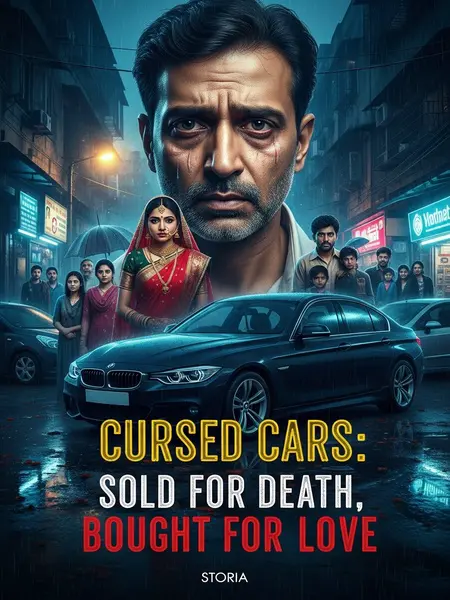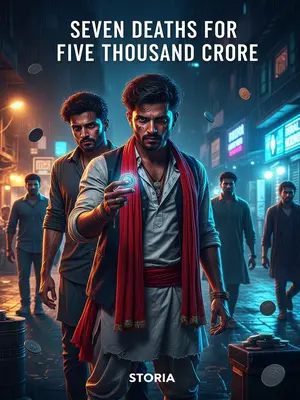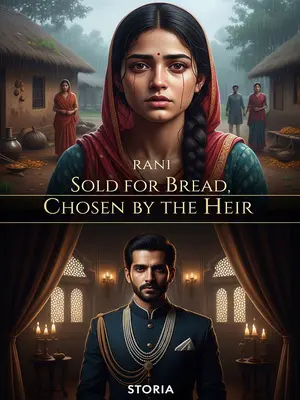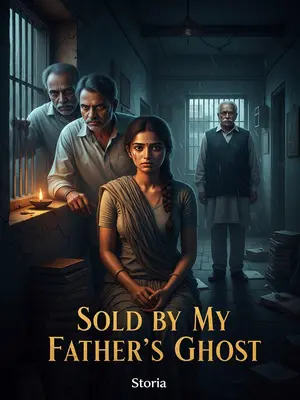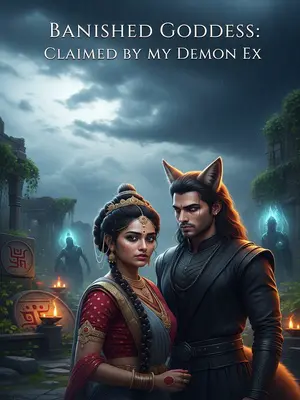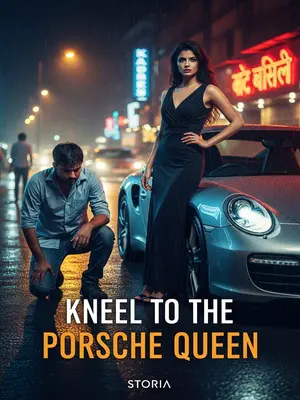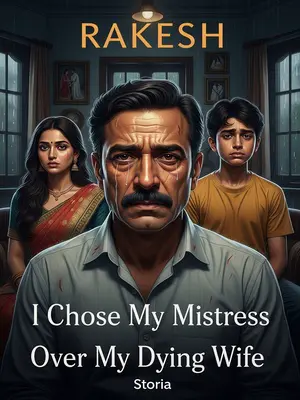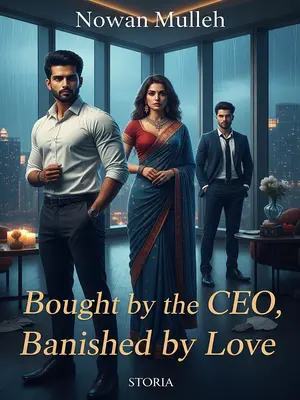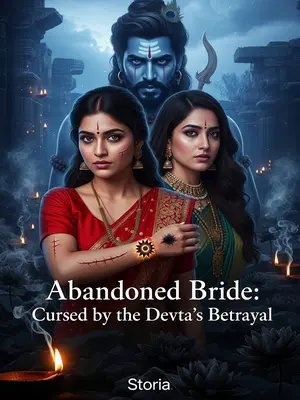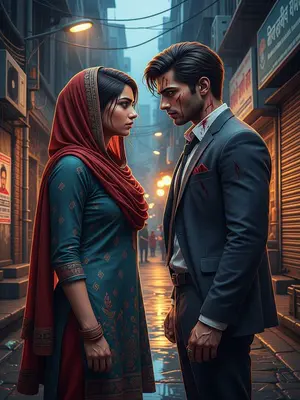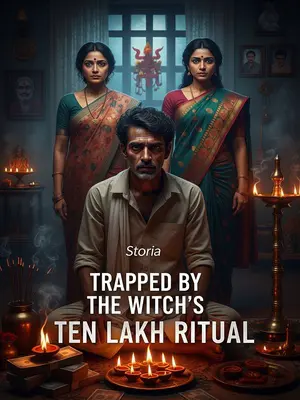Chapter 1: Blood in the Vents
I run a business selling second-hand accident cars, and let me tell you—no sugarcoating here. If the paperwork says a car’s had three accidents, then bhai, it’s exactly three—no hidden jhol. If you’ve got guts and thoda sa luck, and you want a bargain, come to me.
If you’re looking for shiny cars and sweet talk, go to the showroom. If you want the truth, come find me under the blue tarp.
Arrey, yeh koi showroom nahi hai, samjhe? No glass doors, no salesmen in suits. Just me, my blue tarp, and the tyre wallah next door. The air always smells of petrol and frying samosas, and the soundtrack is city horns and the chaiwala’s radio. But one thing I’ll swear on my daughter’s head—my word is as solid as Mumbai’s monsoon.
1
I’ve been in the accident car line for years, but today—today was something else, yaar.
Every day, there’s a new story—some enough to make your heart heavy, some so weird you’ll get goosebumps in this garmi. But today, even the chaiwala paused mid-pour as the drama unfolded outside my shop.
She barged in, dupatta flying, eyes blazing. The chaiwala paused mid-pour, and even the rickshaw drivers craned their necks.
Early morning, a woman almost dragged her boyfriend inside, storming up to me like she owned the lane. Before she even opened her mouth, her body screamed anger—jaw tight, one sandal half off. She confronted me, shouting that the car I sold her boyfriend was haunted: whenever the AC switched on, blood spurted from the vents, then vanished when they looked again.
In this business, people come with all kinds of superstitions—chudails, bad luck, even monkeys in the engine. Still, her voice echoed through the lane, drawing the idling rickshawallas and even the sabziwalli stopped sorting bhindi. The paanwala peered over his counter, eager for gossip.
Listen, I sell accident cars—if a car’s only had one accident, that’s rare. People see all sorts of things in these cars. Blood spraying from the vents? Not even the wildest story I’ve heard. They were making a mountain out of a molehill.
Arrey baba, in our trade, if the seatbelt works and the engine doesn’t stall in Ghatkopar traffic, customers should do a pooja in my name. Once, a man claimed to see a bhoot in the rearview—turned out to be his own face after a late-night poker game.
I glanced at the boyfriend—he looked familiar. Sure enough, he’d bought a car from me recently. A quick check in my register: Rohan Singh, 2020 BMW X1, 5.8 lakh.
Rohan had that middle-class, nervous vibe—like a teacher’s son trying to look bigger than he felt. That day, his hair was oiled, shoes shined extra hard. Trying hard to be a big man.
He’d told me—marriage coming up, can’t afford new, but can’t lose face. He wanted a deal. I warned him: second-hand accident car for wedding, not good shagun. If money’s tight, take a regular used one—just a bit pricier. But he insisted on this.
I gave it to him straight, like you’d tell your own chota bhai: “Bhai, wedding is new shuruat. Why start with someone else’s bad luck?” But he kept looking at his soon-to-be bride, wanting to impress.
I told him the truth: last owner was a drunk uncle who crashed headfirst into a cement pillar. Body and head separated—scene was so gory, even the policewala fainted.
As I told the story, Rohan’s face lost colour, but he kept nodding, eyes darting to his girlfriend—scared she’d back out. A bead of sweat rolled down his temple, even with the fan churning at full speed.
Rohan agreed to everything, signed the contract in one go. Since his girlfriend was there, I just hinted, “Bhaiya, you know what you’re getting.”
I gave him that classic Indian look—eyebrow up, side glance. His hand trembled as he signed, but pride is a stubborn thing.
Before Rohan could even open his mouth, his girlfriend snapped, “Your shop is shady! The cars you sell are evil! My mother’s in hospital on a drip now—take the car back and compensate us!”
She jabbed a finger at my chest, her gold bangles jangling, lips pursed in that Delhi-girl way that brooks no nonsense. A few aunties stopped their gossip, leaning in. She pressed the point, her voice rising above the honking and temple bell outside.
Arrey yaar, they were trying to squeeze me for money. Rohan knew what he bought. He should’ve spoken up. Clearly, he hadn’t told her the truth.
Inside, I wanted to tell him, “Arrey bhai, tell the truth—save yourself this tamasha!” But he just stared at his feet, shoulders hunched.
As they say, better to break a well than break a marriage. I didn’t want to argue, so I pulled out the sales contract.
My heart was thumping, but I kept it cool. “Beta, sab likha hai paper mein. Once sold, no returns, no exchanges.” I tapped the contract for effect. In my line, paperwork is your talisman.
"Bhaiya, black and white—you agreed, na? Once sold, no returns or exchanges."
Rohan’s hand hovered over the paper, eyes flicking to Priya, then back to me. His Adam’s apple bobbed—he swallowed hard, but pride held him steady. He nodded, tugging Priya’s sleeve: “Priya, let’s just drop it. Your mom’s old, maybe she’s seeing things.”
Priya shook him off. “My mom might hallucinate, but you and I aren’t old—how could we both see the same thing? The problem is your car. You got scammed!”
By now, the crowd was thick. A little boy with vada pav giggled. I kept my poker face, waiting for Priya’s drama to finish.
She turned to me: “Boss, have you no shame? Selling this kind of car—you’ll die a miserable death! If you don’t return the car and compensate us, I’ll shut your shady shop down. How dare you call yourself honest!”
Whispers flew—“Dekho, carwala phas gaya!”—like I was a villain from some 8 pm serial. I felt every eye burning my back.
I pride myself on being fair. In all these years, I’ve never cheated anyone. My reputation means more than a few notes. Every year, my daughter’s principal calls me for car advice, not for sales—because Sharma-ji speaks straight.
Suppressing irritation, I looked at Rohan. “Bhaiya, what do you want to do?”
He scuffed his shoe, mumbling like he wished he could vanish.
He was a pushover, stammering, unable to get words out. The way he hung his head, you’d think he was waiting for a schoolmaster’s scolding. Priya’s glare could’ve curdled milk.
Priya glared. “Useless! Got scammed and don’t even speak up. Spent 5.8 lakhs on something cursed. I bet someone died in it!”
Her words cut like a knife. Aunties nodded, as if she was championing all wronged women in Mumbai.
I smiled—she hit the nail on the head.
A sly smirk escaped, but I hid it behind a cough. Sometimes, customers know more than they admit.
To save face for customers, my shop’s name is as proper as it gets: Victory Second-Hand Car Dealership. If regulars come, I send them next door—no need to mix happy occasions with haunted stock.
I asked, “What exactly do you want?”
Priya snorted, eyes full of contempt. “Simple. Return the car and pay triple compensation—5.8 lakh times three. 17.4 lakhs.”
Bystanders whistled—triple compensation? Lottery bhi fail hai! Still, I nodded, no arguments. No point raising my blood pressure.
Priya was delighted. “Good, pay up and I won’t bother you.”
I could see the calculation in her eyes. Rohan, meanwhile, looked like he wished he could sink through the floor.
Seeing Rohan still silent, I invited Priya to sit. “Priya, do you know how much a new BMW X1 costs?”
She hesitated, then said, “At least 20–30 lakhs, right?”
For once, her tone softened. She realised the math didn’t add up.
“Exactly. 2020 model, less than 10,000 km. You think you’d get it for 5.8 lakhs if nothing was wrong?”
A hush fell. Even the rickshaw wallah stopped his meter, waiting for the punchline.
Priya was stunned. “What are you saying?”
Her eyes darted between me and Rohan, finally catching on.
Rohan saw things turning and cut in, “No return, I accept. Let’s go.”
He tried to grab her hand, but Priya jerked away as if burned.
Priya shoved him aside, confused. “Go where? Explain!”
The tension was thick, like pre-monsoon air. I gave him a last chance, but he wouldn’t take it.
I said, “Normally, this car would cost 15 lakhs. Why did you get it for 5.8? Because it’s an accident car—the last owner died in a major crash. I told him. It’s in the contract—see for yourself.”
I slid the contract across. Priya snatched it, hands trembling.
Priya’s face changed. She grabbed the contract, read, then exploded. She slapped Rohan—hard.
The first slap echoed, freezing everyone. Even the sabziwalli stopped sorting bhindi. Rohan’s cheeks burned red, and Priya didn’t stop. One, two, three—each slap sharper than the last. For a moment, there was only silence, the air thick with shock.
“Rohan, you actually bought a car someone died in and tried to trick me? You made my mom sick enough for hospital. I’m not done!”
Her words had the weight of every wronged daughter-in-law from every soap serial. Rohan stood, helpless, cheeks blazing as passersby stared.
Still not satisfied, she slapped him twice more.
Each slap landed like a drumbeat. Some in the crowd looked away, embarrassed; others just stared.
Rohan covered his face with both hands, shoulders shaking, like a schoolboy caught cheating during an exam. “Priya, I had no choice. Your family wants a 20 lakh rupees shagun and a flat in the city. My family can’t afford a car.”
His voice cracked. For a second, even Priya’s anger wavered, but pride kept her burning.
Priya’s anger flared. “So you admit it! Now you regret it? I’m calling off the wedding. We’re done! What a joke!”
With that, she stormed out, slippers smacking the floor. Rohan squatted, looking miserable.
A few people lingered, whispering, then drifted away. The shop settled into its usual rhythm.
After a while, he looked up. “Boss, I really had no choice. Wanted a better car, but my family just doesn’t have the money. Her family is a bottomless pit. She even wants me to help her brother with a down payment.”
I sighed. The world expects so much from a man about to marry. Still, business is business. I handed him a bottle of water, letting him sit in the shade.
A grown man in his thirties, crying like a child. My mother used to say: a man’s tears are as rare as rain in May.
I gave him space—sometimes, all you can do is let someone cry. I sympathised, but business is business.
I patted Rohan’s shoulder, told him to let it go. He nodded, apologised, and left.
He walked out slow, like the world was on his shoulders. I watched him disappear, feeling a strange heaviness myself.
But I didn’t expect what came next—late that night, Uncle Dev from the cremation ground called. “Sharma-ji, 2020 BMW X1—just came in. Want to buy it?”
The dead come, the dead go. Business in this city never stops, not even for a night.
